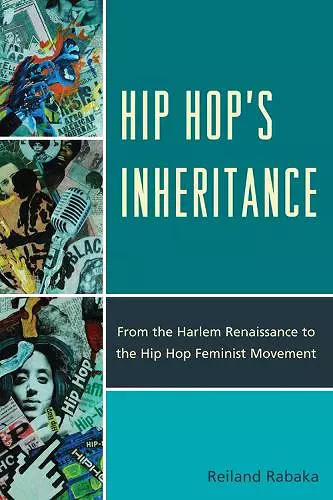Hip Hop's Inheritance
From the Harlem Renaissance to the Hip Hop Feminist Movement
Format:Hardback
Publisher:Lexington Books
Published:31st Mar '11
Currently unavailable, and unfortunately no date known when it will be back
This hardback is available in another edition too:
- Paperback£46.00(9780739164815)

Hip Hop's Inheritance arguably offers the first book-length treatment of what hip hop culture has, literally, "inherited" from the Harlem Renaissance, the Black Arts movement, the Feminist Art movement, and 1980s and 1990s postmodern aesthetics. By comparing and contrasting the major motifs of the aforementioned cultural aesthetic traditions with those of hip hop culture, all the while critically exploring the origins and evolution of black popular culture from antebellum America through to "Obama's America," Hip Hop's Inheritance demonstrates that the hip hop generation is not the first generation of young black (and white) folk preoccupied with spirituality and sexuality, race and religion, entertainment and athletics, or ghetto culture and bourgeois culture. Taking interdisciplinarity and intersectionality seriously, Hip Hop's Inheritance employs the epistemologies and methodologies from a wide range of academic and organic intellectual/activist communities in its efforts to advance an intellectual history and critical theory of hip hop culture. Drawing from academic and organic intellectual/activist communities as diverse as African American studies and women's studies, postcolonial studies and sexuality studies, history and philosophy, politics and economics, and sociology and ethnomusicology, Hip Hop's Inheritance calls into question one-dimensional and monodisciplinary interpretations or, rather, misinterpretations, of a multidimensional and multivalent form of popular culture that has increasingly come to include cultural criticism, social commentary, and political analysis.
Rabaka (Univ. of Colorado, Boulder) offers a sweeping historical assessment of cultural ideologies connecting hip-hop to artistic innovations of the Harlem Renaissance and Black Arts movements. He mobilizes cultural theorists — Baraka, Foucault, DuBois, Jameson, Said, Fanon, Hurston — to describe the evolution of African American intellectual and cultural history via 'radical humanism, and democratic socialism.' Sprawling overviews of Africana critical theory, feminist theory, and queer theory imagine, 'anti-racist, anti-capitalist, anti-colonialist, and sexual orientation-sensitive critical theory of contemporary society.' The author provides interesting, if diffuse, discussion of gay literary voices in the Harlem Renaissance in relation to the contemporary homo-hop movement; Black Arts Movement members' perception of the 'aesthetic radicalism of the Harlem Renaissance'; and the 'black aesthetic' sensibility that ''authentic' black art was always historically grounded, politically engaged, socially uplifting, and consciousness-raising.' In exploring the relationships between the black women's liberation, feminist art, and hip-hop feminist movements, Rabaka mines work by Patricia Collins. In a final chapter, he considers postmodernist approaches to popular culture while asserting that 'rap music re-Africanizes and reanimates African American music, all the while continuing the African Americanization of mainstream American music and popular culture....' Summing Up: Recommended. Upper-division undergraduates, graduate students. * CHOICE *
You remember when you fell in love with hip-hop. Now, be reminded why. * SoulTrain.com *
Reiland Rabaka demonstrates, with great agility, that hip-hop has wide-reaching artistic and intellectual roots in the history of African American cultural production. This book is an essential addition to an expanding corpus of rich scholarship on hip-hop. It is a welcome contribution with fresh perspectives on the dynamics of gender, class and race in the context of hip-hop-beyond beats and rhymes. -- Jeffrey Ogbar, University of Connecticut
Hip-Hop's Inheritance is an extraordinary journey through the last decade of hip-hop criticism that situates the contemporary hip-hop moment into the historical continuum of black political, cultural and gender struggles in the US. With unflinching compassion, piercing intellect and unwavering scholarship,Reiland Rabaka advances a long overdue critical theory of hip-hop culture. -- Bakari Kitwana, author of Why White Kids Love Hip-Hop: Wankstas, Wiggers, Wannabes and the New Reality of Race in America
ISBN: 9780739164808
Dimensions: 239mm x 163mm x 26mm
Weight: 626g
302 pages